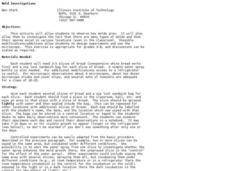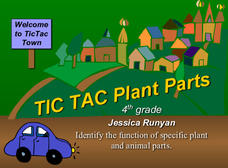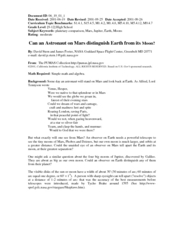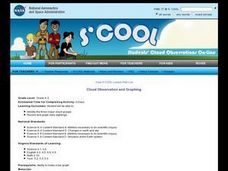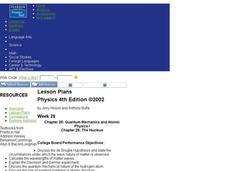Curated OER
World In Motion Curriculum
Students explore the night sky and its solar system. Using a Digitarium planetarium system, students observe four constellations. They discover the phases of the moon and eclipses. Students recognize the difference between normal and...
Curated OER
Mold Investigations
Students observe mold growth on bread. In this mold growth lesson, students place bread in various locations and in various conditions to investigate how location, moisture, temperature, and other variable impact the growth of mold on...
Curated OER
F(x)g(x): A Tale of Two Functions
In this graphing functions worksheet, students solve four problems where they graph given functions, find the sum related to the area under the curve and determine an integral.
Curated OER
Identifying Metamorphic Rocks
For this earth science worksheet, 7th graders classify rock samples according to chart provided and physical properties of the rocks. They answer 2 analysis questions and formulate a conclusion.
Curated OER
The Joy Luck Club by Amy Tan
In this online interactive reading comprehension activity, students respond to 14 multiple choice questions about The Joy Luck Club. Students may submit their answers to be scored.
Curated OER
Tic Tac Plant Parts
This plant biology PowerPoint introduces plant parts and their functions. This PowerPoint allows students to identify each plant part on a diagram, along with its' function. The slides contain a clear explanation of how each plant part...
Curated OER
Can an Astronaut on Mars Distinguish Earth from its Moon?
Learners explore the possibility of being on Mars and being able to identify the Earth. In this space lesson students complete a set of calculations to see if this is possible.
Curated OER
Collecting Electromagnetic Radiation
Students using different experiments and activities explore electromagnetic radiation and the effect on the Earth.
Curated OER
Physics- global warming
Students discuss the concept of global warming and view a multimedia clip on the global warming phenomenon. They statistically analyze mean temperature data and compare a given set of data. Data on atmospheric CO2 is done then they...
Curated OER
Flower Pigments
Students experiment with Thin Layer Chromatography to separate pigments found in flower petals.
Curated OER
Spectral Surprise
Students experience a model that produces, separating, and displaying spectral colors.
Curated OER
Chloroplasts and Pigments
In this plant pigments worksheet, students compare the function of 3 types of pigments: chlorophylls, carotenoids, and phycobilins. This worksheet has 23 fill in the blank, 3 drawing, and 2 short answer questions.
Curated OER
Cloud Shadows
Students classify clouds as transparent, translucent or opaque. They conduct an experiment to determine the visual opacity of several classroom objects and then conduct further observations of clouds.
Curated OER
Sea Ice Research
Young scholars study sea ice and its importance in climate and climate change. They discuss sea ice as a presence of a food source for marine animals in the arctic and complete a lab activity. After completing the lab, they watch a...
Curated OER
Conservation for the Ages
High schoolers use the Internet to research a topic about energy conservation. They summarize the research information in an original studenT book and visit a local elementary school to present their projects.
Curated OER
Word Confusions: Lesson Eleven
A very basic presentation about homonyms, this slide show might be too short for your grammar lecture. However, if you pair it with the other presentations to which it is linked, you might be able to implement it more successfully. The...
Curated OER
INFRARED OLD FAITHFUL
Students view video clips and still images of Old Faithful and review the main questions and curiosities regarding Old Faithful. They break into groups and take on the roles of explorers and have come upon this interesting geothermal...
Curated OER
Jupiter's Moons
Students predict which of Jupiter's moons will be the "brightest" in infrared wavelengths. Using provided information, they rank the moos from brightes to faintest in infrared.
Curated OER
Finding Jupiter's Moons
Students explore Jupiter's Moons. They calculate and predict the location of Jupiter's 4 large moons. In addition, they draw Jupiter with its moons correctly shown for the time of the observation.
Curated OER
Sunspots: Correlating Sunspots to Active Regions
Students investigate sunspots. They use solar imaging from satellite instruments which are currently circling the sun. Students compare images from the satellites and determine the existence of a correlation between the two types of...
Curated OER
Cloud Observation and Graphing
Learners identify the three major cloud groups. They are introduced to the three main cloud types and spend a week making and recording observations of clouds. Students produce a graph that presents their findings and conduct research...
Curated OER
Using Maps To Make Public Health Decisions Case Study: Wildfires in Mexico 2000
Young scholars study environmental health. Using actual NOAA satellite imagery, students investigate the basic concepts of mapping. They explore the relationship between monitoring satellite images and public health decision making.
Curated OER
Quantum Mechanics and Atomic Physics
Students will discuss the de Brogile Hypothesis and state the circumstances under which the wave nature of matter is observed. They will also calculate the wavelengths of matter waves.
Curated OER
Roaming Biomes
Students use the Internet to research the capabilities of earth-observation satellites. Using the information, they write a report on how remote-sensing technology is used to measure the impact of climate change. They identify the...
Other popular searches
- Visible Light Spectrum
- Visible Light and Color
- Visible Light Middle School
- Properties of Visible Light
- Visible Light Color
- Wavelength Visible Light
- Wavelength, Visible Light
- Visible Spectrum Worksheet
- Science Visible Light



